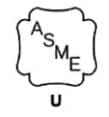Autoclave Sterilizer Explainer: What is an “ASME stamp”?
By: Priorclave North America
Categories: Health & Safety Lab Autoclaves Steam Autoclaves

Having an “ASME stamped” pressure vessel is one of the key price differentiators for an autoclave sterilizer. The is especially the case with the smaller autoclaves marketed towards start-up research labs, microbrewers, and the cannabis industry. As a rule, autoclave sterilizers that don’t have an ASME stamp are going to be cheaper—and, as always, you get what you pay for. Earning that ASME stamp is an expensive and arduous undertaking—manufacturers have to be deeply committed to their production process in order to make the grade. Correspondingly, when you see the ASME stamp, you know that you’re looking at pressure vessel that is up to the tasks it will be performing.
But what is an “ASME stamp”? Why is it important? And why do cheap autoclaves tend not to earn one?
Why Do You Want an ASME-stamped Autoclave Sterilizer?
Any container that can be pressurized can be dangerous—and that includes autoclave sterilizers. For decades, the American Society of Mechanical Engineers (ASME) has maintained a rigorous set of technical standards to assure the safety of all sorts of pressure vessels and fittings. These apply to every step of that item’s manufacturing and testing, and have become the accepted hallmark of safety and reliability.

Priorclave’s ASME Stamp
In order to earn an ASME stamp, an item must be manufactured in a facility, and using a process, that third-party inspectors have verified conforms to the ASME Boiler and Pressure Vessel Code. That inspection starts with the sourcing of individual components and base materials, and culminates with final hydrostatic testing to demonstrate that the ASME-stamped pressure chamber will actually perform as expected under real-world conditions.
In contrast to other certification systems, ASME does not offer blanket approval for a facility: If a factory producing an ASME-stamped pipe fitting wants to also produce ASME-stamped autoclave sterilizer pressure vessels, that entire pressure-vessel production process has to be separately inspected, approved, and certified. This is fundamentally a set of standards committed to life safety; there are no shortcuts with ASME.
To find out if your state or province requires the ASME stamp (Section VIII of the Pressure Vessel Code), see the National Board Synopsis of Boiler and Pressure Vessel Laws, Rules and Regulations.

